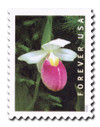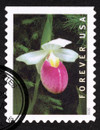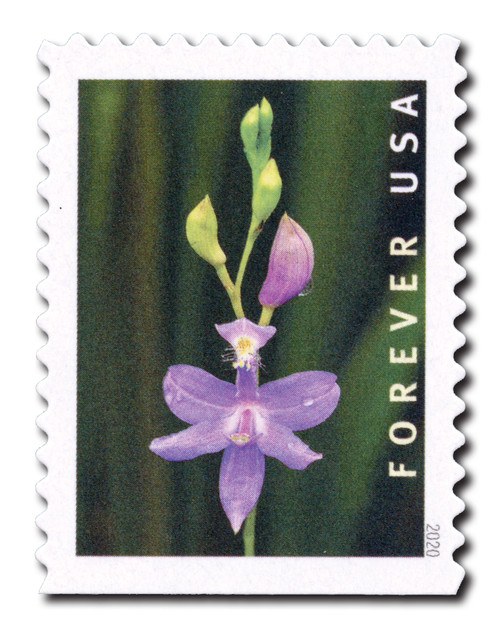
# 5448 - 2020 First-Class Forever Stamp - Wild Orchids (booklet): Cypripedium reginae
US #5448
2020 Cypripedium Reginae – Wild Orchids (Booklet)
- Pictures the showy lady’s slipper orchid
- Part of the Wild Orchids set picturing nine orchid species native to the United States (one species shown twice)
Stamp Category: Definitive
Set: Wild Orchids
Value: 55¢ First Class Mail Rate (Forever)
First Day of Issue: February 21, 2020
First Day City: Coral Gables, Florida
Quantity Issued: 500,000,000
Printed by: Banknote Corporation of America
Printing Method: Offset
Format: Double-sided Booklets of 20
Perforations: Serpentine die cut 10 ¾ x 11 on 2 or 3 sides
Tagging: Phosphor tagged paper, block
Why the stamp was issued: To showcase the beauty and diversity of different species of wild orchids.
About the stamp design: Pictures a photograph by Jim Fowler of the showy lady’s slipper orchid, a species that grows wild in the United States.
First Day City: The First Day of Issue Ceremony was held in Coral Gables, Florida, home to the headquarters of the American Orchid Society.
About the Wild Orchids set: Includes 10 stamps picturing photographs by Jim Fowler of nine different orchids (one species shown twice) native to the United States. Species include: the three birds (pictured twice), California lady’s slipper, crested coralroot, showy lady’s slipper, marsh lady’s tresses, eastern prairie fringed, greater purple fringed, grass pink, and yellow cowhorn orchids. These are all beautiful wildflowers that most people don’t get the opportunity to see. They’re all hard to find today.
History the stamp represents: Many people in the United States do not realize the number of wild orchid species native to our country. Part of this is because some plants are not immediately recognized as being orchids.
Some of the most beautiful plants native to North America are “lady’s slippers” orchids. Many people may have seen them on hikes through wooded swamps or along shady riverbanks and not realized they are actually a type of orchid. The most striking variety is Cypripedium reginae, sometimes called the “showy lady’s slipper,” “pink and white lady’s slipper,” or the “queen’s lady’s slipper.”
Cypripedium reginae is easily identified by the iconic shape of its flowers. The blooms are mostly white with the very bottom petal being pink to magenta and shaped like a pouch. The showy lady’s slipper prefers wetland habitats with very loose soil and partial shade. It grows up to three feet tall with several stems and flowers from the same root base. The flowers appear in early to mid-summer with one to two blooms per stem.
The showy lady’s slipper is a particularly rare species. It is a victim of increased draining of wetlands, water contamination, and other habitat destruction. Without increased environmental awareness, this beautiful orchid may one day disappear completely.
US #5448
2020 Cypripedium Reginae – Wild Orchids (Booklet)
- Pictures the showy lady’s slipper orchid
- Part of the Wild Orchids set picturing nine orchid species native to the United States (one species shown twice)
Stamp Category: Definitive
Set: Wild Orchids
Value: 55¢ First Class Mail Rate (Forever)
First Day of Issue: February 21, 2020
First Day City: Coral Gables, Florida
Quantity Issued: 500,000,000
Printed by: Banknote Corporation of America
Printing Method: Offset
Format: Double-sided Booklets of 20
Perforations: Serpentine die cut 10 ¾ x 11 on 2 or 3 sides
Tagging: Phosphor tagged paper, block
Why the stamp was issued: To showcase the beauty and diversity of different species of wild orchids.
About the stamp design: Pictures a photograph by Jim Fowler of the showy lady’s slipper orchid, a species that grows wild in the United States.
First Day City: The First Day of Issue Ceremony was held in Coral Gables, Florida, home to the headquarters of the American Orchid Society.
About the Wild Orchids set: Includes 10 stamps picturing photographs by Jim Fowler of nine different orchids (one species shown twice) native to the United States. Species include: the three birds (pictured twice), California lady’s slipper, crested coralroot, showy lady’s slipper, marsh lady’s tresses, eastern prairie fringed, greater purple fringed, grass pink, and yellow cowhorn orchids. These are all beautiful wildflowers that most people don’t get the opportunity to see. They’re all hard to find today.
History the stamp represents: Many people in the United States do not realize the number of wild orchid species native to our country. Part of this is because some plants are not immediately recognized as being orchids.
Some of the most beautiful plants native to North America are “lady’s slippers” orchids. Many people may have seen them on hikes through wooded swamps or along shady riverbanks and not realized they are actually a type of orchid. The most striking variety is Cypripedium reginae, sometimes called the “showy lady’s slipper,” “pink and white lady’s slipper,” or the “queen’s lady’s slipper.”
Cypripedium reginae is easily identified by the iconic shape of its flowers. The blooms are mostly white with the very bottom petal being pink to magenta and shaped like a pouch. The showy lady’s slipper prefers wetland habitats with very loose soil and partial shade. It grows up to three feet tall with several stems and flowers from the same root base. The flowers appear in early to mid-summer with one to two blooms per stem.
The showy lady’s slipper is a particularly rare species. It is a victim of increased draining of wetlands, water contamination, and other habitat destruction. Without increased environmental awareness, this beautiful orchid may one day disappear completely.














